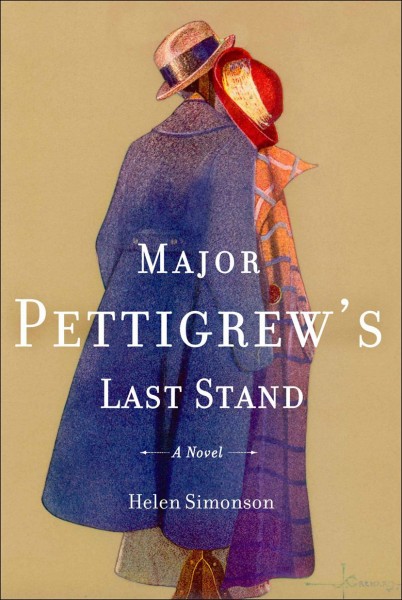Helen Simonson, Major Pettigrew’s Last Stand
reviewed by Danielle L. Parker

Major Pettigrew’s Last Stand Publisher: Random House, 2010 Length: 355 pp. ISBN: 978-1-4000-6893-7 |
These days, the deep-seated impulses of the greatest works in the genre too often degrade into a stereotypical alpha male dominating fantasy females. And let’s not forget the obligatory pays-the-bills porn we live with now. Even the disturbing death-as-sex metaphors of the original Dracula turn into the schoolgirl fantasies and dreamy-eyed poet vampires of Twilight. To me, reading a garden-variety modern romance is like sniffing a vintage perfume whittled by corporate greed into a ghost of its former glory. The scent is half-recognizable, but the thing’s a caricature.
Of course, those cutting comedies of manners pioneered by Jane Austen are different beasts. Austen wrote three-dimensional men and women, real societies, while playing, tongue-in-cheek, with those same romantic fantasies. And Major Pettigrew’s Last Stand is a worthy successor to those seminal comedies of manners.
We have a retired widower, Major Pettigrew, living alone in a small village. Major Pettigrew is a last survivor of that tongue-tied, gruff, proper English manners generation. Like his village, he’s blind to his own bigoted presumptions of class, race, and religion. His regimental tie might choke him, but he suffers without complaint. Not manly to complain or fail to do what’s proper.
Yet the major is a lonely man. When his brother dies, the major suffers a shock. Then there’s the boorish manners and social cluelessness of his shallow, mercenary son. The boisterous crudities of a gate-crashing American real-estate developer. His son’s new fiancée, who presumes to call him by his first name instead of “Major.” The venerated-because-of-his-class local lord who sells out to the crass barbarians. The rudeness and greed of his in-laws. The major is overwhelmed.
The widowed local shopkeeper, a Pakistani woman named Mrs. Ali, offers him a cup of tea with kindness. The attraction there’s from the start, and slowly the friendship grows. But on one hand the disparate couple faces the constraints of Mrs. Ali’s scandalized family, and on the other, the gossip of their little village.
This story is as much about the major’s slow growth as a person as anything. The major little realizes how much he has in common with the boors he despises. He lusts after a prize shotgun from his brother’s estate that long formed a wedge of resentment between the two brothers. He suffers from the same lickspittle class consciousness his son exhibits. He fails to speak up against the gossips and hypocritical bigots. He fails to rebuke the Vicar who gives him a torturous homily about the virtues of marrying one’s own kind. And when push comes to shove, at a memorable village dance, does the major have the courage to stand by his new love? He doesn’t.
But in the end, in his own human, bumbling fashion, he manages to grasp happiness and discover what really matters in life. He plucks out the mote in his own eye.
This is a touching book without demonstrating the least flaw of sentimentality. That’s no easy trick. If you want to read a good romance, which is, as it should be, about human nature and society, pick up this one. Enjoy!
Copyright © 2011 by Danielle L. Parker

